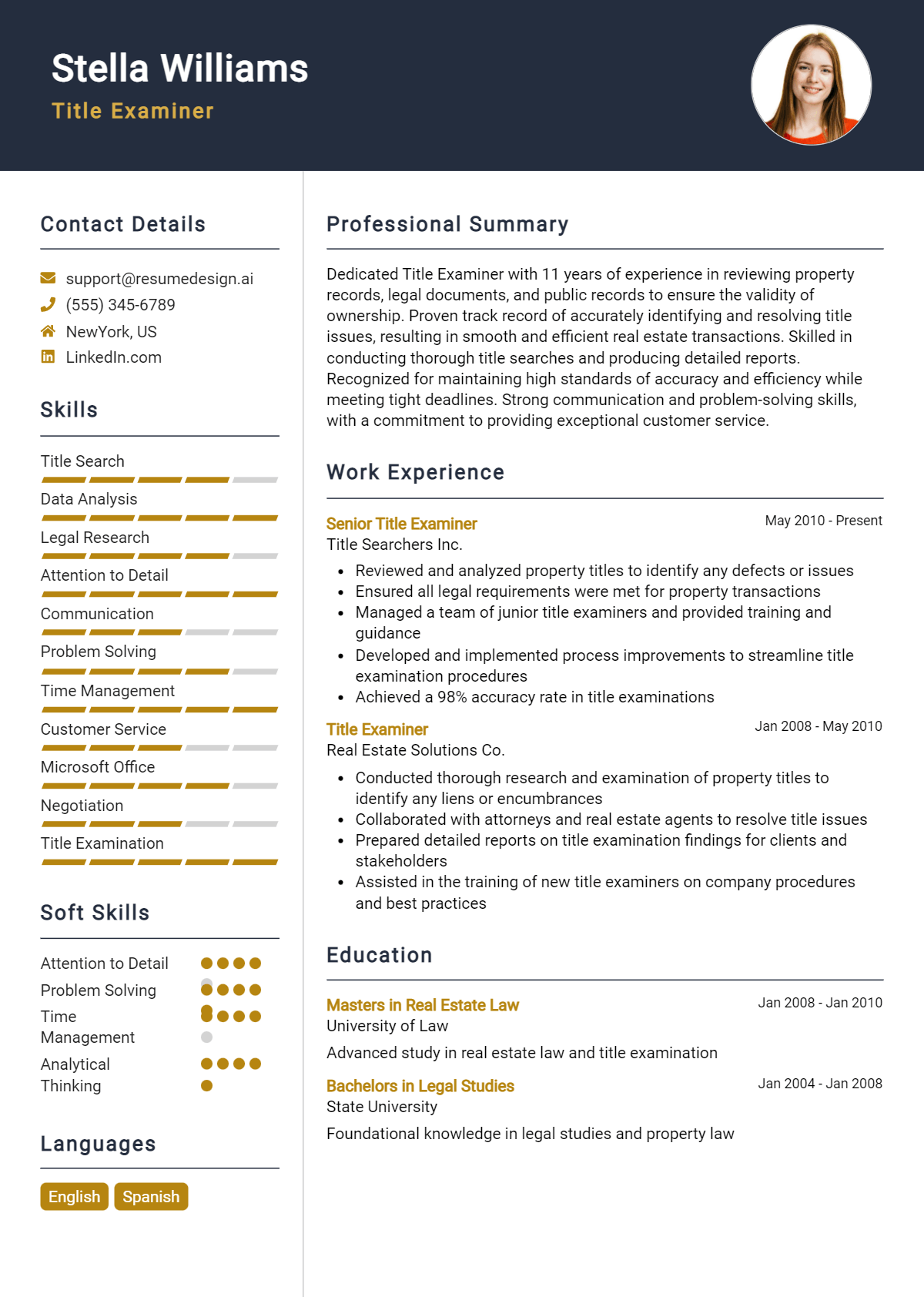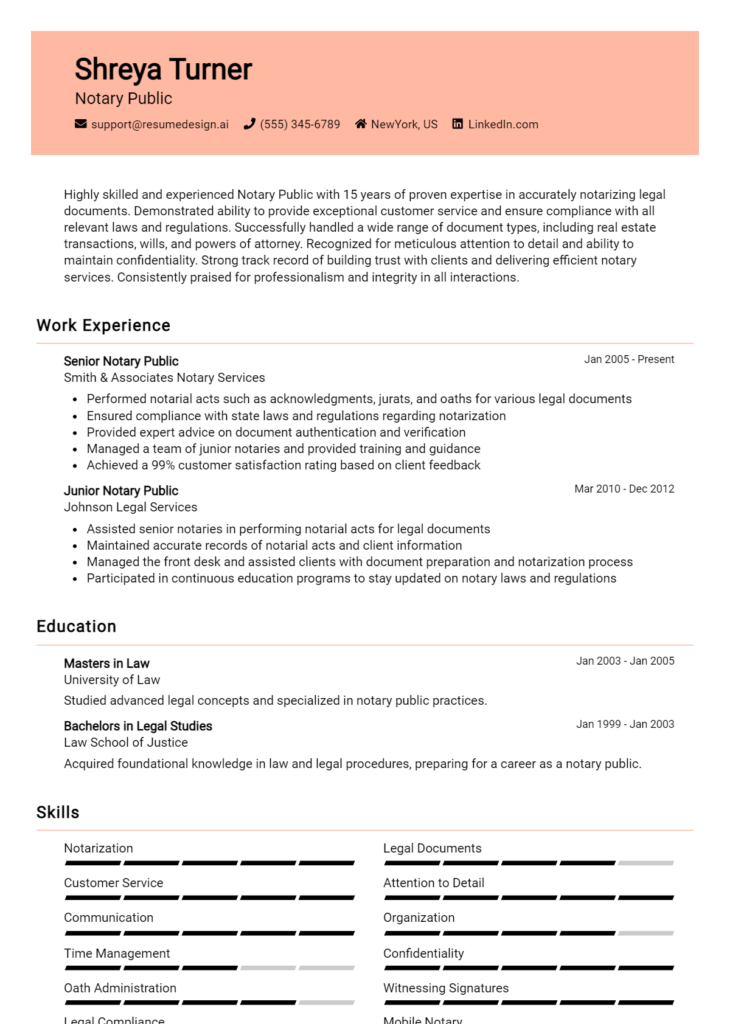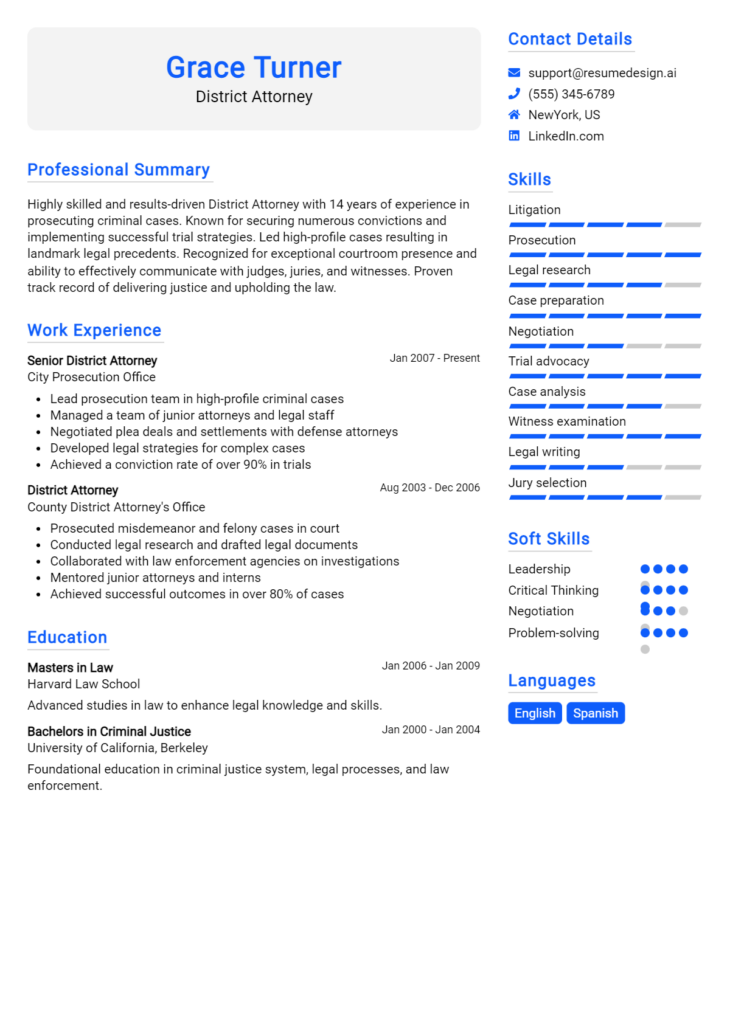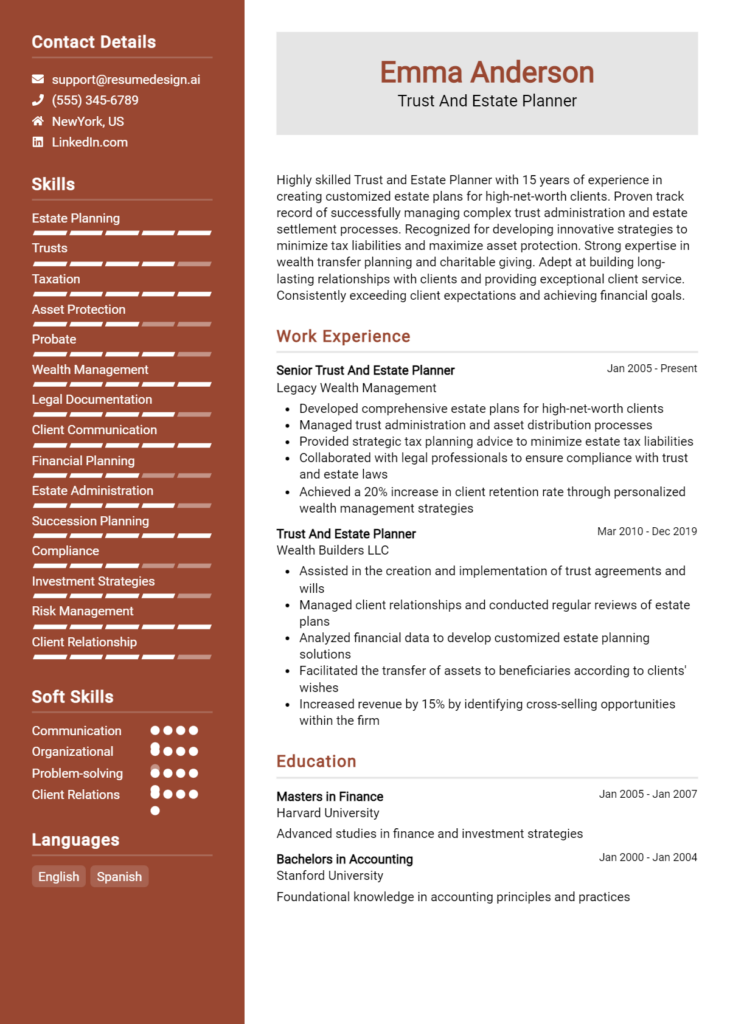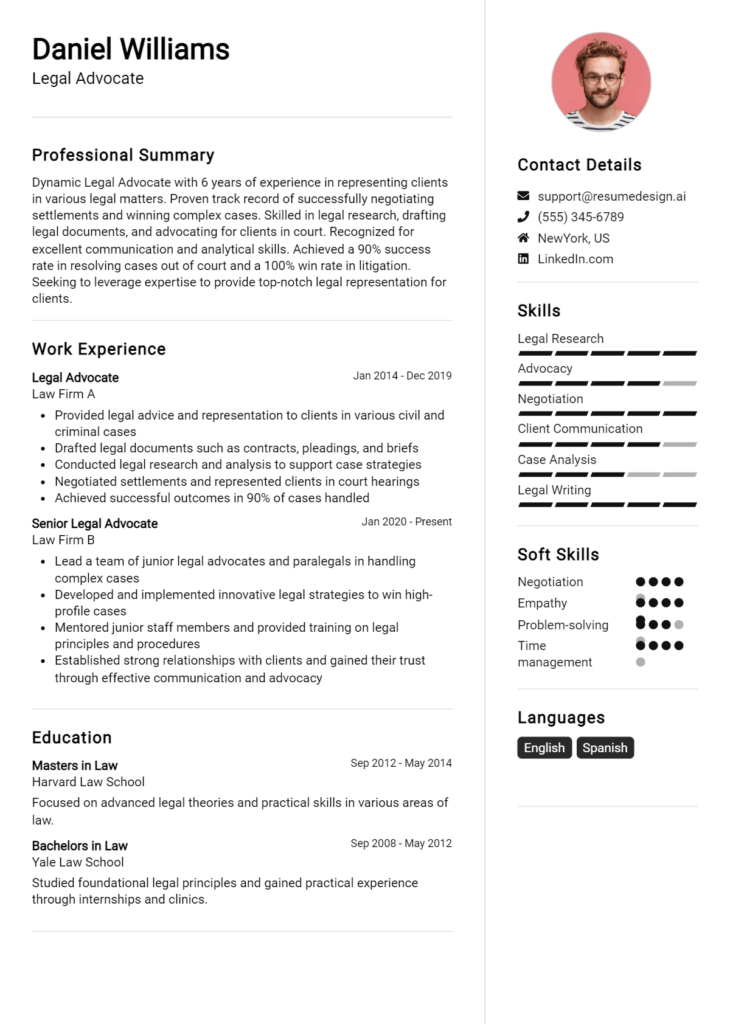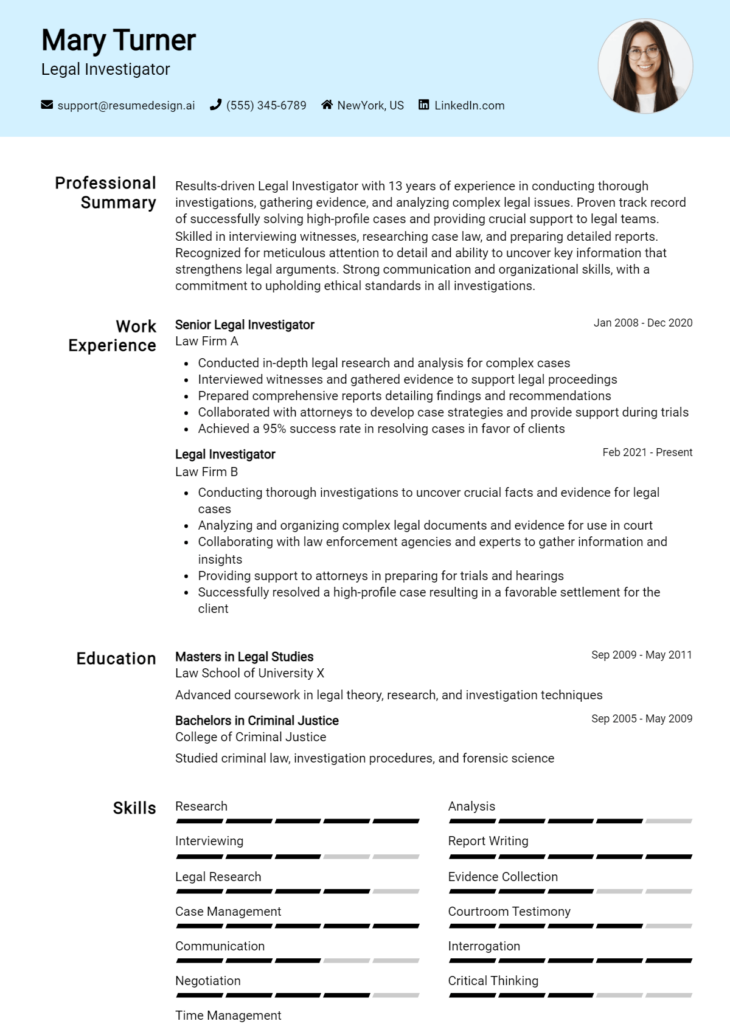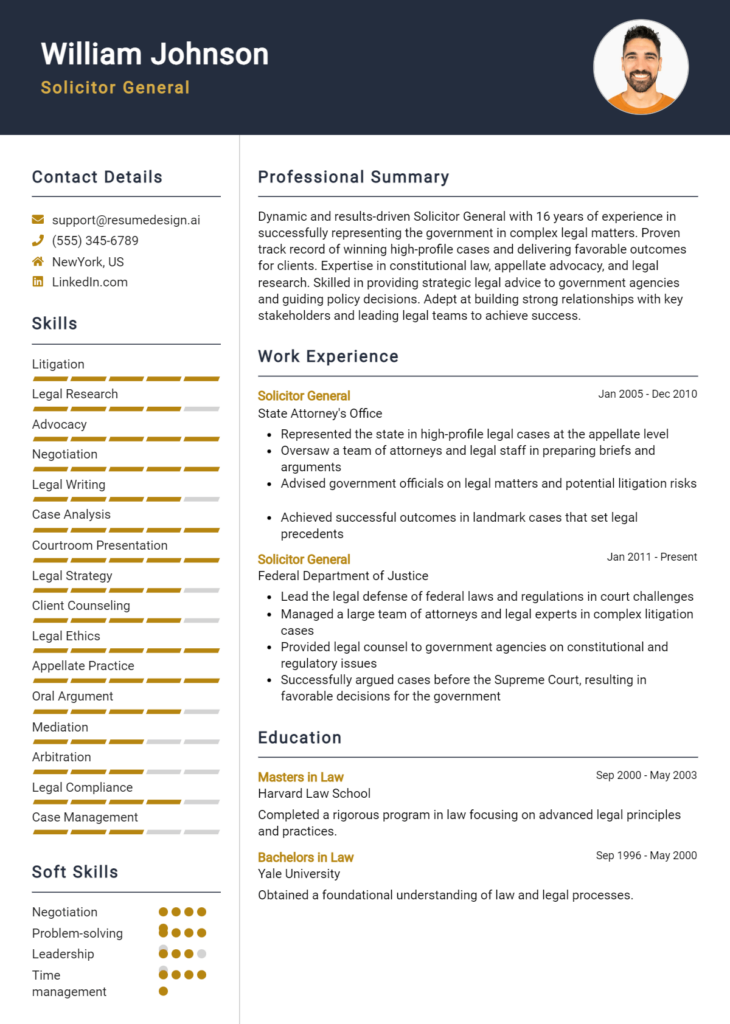Title Examiner Core Responsibilities
A Title Examiner plays a crucial role in the real estate and legal sectors by evaluating property titles to ensure they are clear of defects and encumbrances. Key responsibilities include researching public records, analyzing legal documents, and preparing title reports. This position requires strong technical skills in document analysis, operational understanding of real estate transactions, and adept problem-solving abilities to address discrepancies. By bridging legal and administrative departments, the Title Examiner significantly contributes to organizational goals, and a well-structured resume can effectively showcase these essential qualifications.
Common Responsibilities Listed on Title Examiner Resume
- Conduct thorough examinations of property titles and ownership history.
- Research public records, deeds, and legal documents for accuracy.
- Identify and resolve title defects or discrepancies.
- Prepare detailed title reports and summaries for clients.
- Coordinate with legal teams and real estate professionals.
- Assist in the preparation of closing documents.
- Maintain organized records of title searches and findings.
- Stay updated on local and state real estate laws and regulations.
- Provide expert advice on title-related issues.
- Communicate findings clearly to stakeholders and clients.
- Utilize title search software and database management tools.
High-Level Resume Tips for Title Examiner Professionals
For Title Examiner professionals, a well-crafted resume serves as a crucial gateway to career opportunities. It is often the first impression a potential employer has of a candidate, making it vital that the resume not only highlights essential skills and qualifications but also showcases notable achievements within the industry. A strong resume can set you apart in a competitive job market, demonstrating your expertise in title examination and your commitment to the field. In this guide, we will offer practical and actionable resume tips specifically designed for Title Examiner professionals to help you make a lasting impression.
Top Resume Tips for Title Examiner Professionals
- Tailor your resume to the specific job description by incorporating relevant keywords and phrases used in the posting.
- Highlight your experience with title searches, property records, and legal documents to demonstrate your expertise.
- Quantify your achievements by including metrics, such as the number of titles examined or projects completed within a certain timeframe.
- Showcase your familiarity with industry-specific software and tools, such as title management systems and legal databases.
- Include certifications and licenses relevant to title examination, such as a Title Insurance Agent License.
- Utilize a clean and professional format that enhances readability and makes key information easily accessible.
- Incorporate action verbs to describe your responsibilities and accomplishments, making your contributions stand out.
- List any continuing education or training that demonstrates your commitment to staying current in the field.
- Provide a brief summary statement at the top of your resume that encapsulates your career goals and relevant skills.
- Proofread thoroughly to eliminate any errors that could detract from your professionalism and attention to detail.
By implementing these resume tips, Title Examiner professionals can significantly enhance their chances of landing a job in the field. A tailored, polished resume that effectively showcases your skills, experiences, and accomplishments will not only capture the attention of hiring managers but also reinforce your qualifications as a standout candidate in the competitive landscape of title examination.
Why Resume Headlines & Titles are Important for Title Examiner
In the competitive field of title examination, a well-crafted resume headline or title is crucial for standing out in a crowded job market. A strong headline serves as a first impression, capturing the attention of hiring managers and summarizing a candidate's key qualifications in a single impactful phrase. It should be concise, relevant, and directly related to the job being applied for, effectively communicating the applicant’s expertise and value proposition. By strategically positioning themselves with a compelling headline, title examiners can enhance their chances of making a memorable impression that leads to further consideration.
Best Practices for Crafting Resume Headlines for Title Examiner
- Keep it concise: Aim for a headline that is clear and to the point, ideally under 10 words.
- Be role-specific: Use terminology and keywords relevant to the title examiner position.
- Highlight key qualifications: Focus on your most relevant skills or accomplishments.
- Use action words: Begin with strong action verbs to convey confidence and proactivity.
- Avoid jargon: While industry terms are important, ensure your headline is easily understood.
- Tailor for each application: Customize your headline for each job to match the specific requirements.
- Showcase results: If possible, include quantifiable achievements that illustrate your impact.
- Maintain professionalism: Ensure the tone reflects the seriousness and professionalism of the industry.
Example Resume Headlines for Title Examiner
Strong Resume Headlines
Detail-Oriented Title Examiner with 5+ Years of Experience in Property Research
Certified Title Examiner Specializing in Complex Title Searches and Legal Compliance
Proven Track Record in Resolving Title Issues and Streamlining Closing Processes
Weak Resume Headlines
Looking for a Job
Experienced Professional
The strong headlines are effective because they clearly articulate the candidate's specific skills, experience, and accomplishments related to the title examiner role, making it easy for hiring managers to see their fit for the position. In contrast, the weak headlines fail to impress due to their vagueness and lack of relevance, providing no real insight into the candidate's qualifications or suitability for the job. A compelling headline should always aim to grab attention and convey essential information at a glance.
Writing an Exceptional Title Examiner Resume Summary
A resume summary is a critical component for a Title Examiner as it serves as a quick snapshot of the candidate's qualifications, skills, and experience. This brief section can effectively capture the attention of hiring managers by highlighting relevant achievements and expertise that align with the specific demands of the role. A strong summary should be concise and impactful, providing a compelling reason for the employer to delve deeper into the applicant's qualifications. By tailoring the summary to the job description, candidates can ensure that they stand out in a competitive job market.
Best Practices for Writing a Title Examiner Resume Summary
- Quantify achievements: Use numbers to illustrate your successes, such as the number of titles examined or discrepancies resolved.
- Focus on relevant skills: Highlight skills essential for a Title Examiner, such as attention to detail, legal knowledge, and analytical abilities.
- Tailor your summary: Customize your resume summary for each job application to reflect the specific requirements mentioned in the job description.
- Use action verbs: Start sentences with strong action verbs to convey a sense of proactivity and effectiveness.
- Keep it concise: Aim for 2-4 sentences that deliver key information without overwhelming the reader.
- Showcase industry knowledge: Mention familiarity with title examination software and legal compliance to emphasize your expertise.
- Highlight problem-solving abilities: Demonstrate how you have resolved title issues or streamlined processes in previous roles.
- Include certifications: If applicable, mention any relevant certifications or training that enhance your qualifications as a Title Examiner.
Example Title Examiner Resume Summaries
Strong Resume Summaries
Detail-oriented Title Examiner with over 5 years of experience in conducting thorough title searches and resolving complex title issues, resulting in a 30% reduction in processing time. Proficient in utilizing advanced title examination software and maintaining compliance with local regulations.
Dedicated Title Examiner with a proven track record of managing over 1,000 title examinations, identifying discrepancies, and ensuring accurate property records. Recognized for enhancing client satisfaction through meticulous review processes and timely issue resolution.
Skilled Title Examiner with expertise in legal research and analysis, consistently achieving a 95% accuracy rate in title reports. Strong background in collaborating with legal teams to resolve title defects and streamline transaction processes.
Weak Resume Summaries
Experienced Title Examiner looking for a new opportunity. I have worked in the field for several years and know a lot about title searches.
Title Examiner with some experience in the industry. I am detail-oriented and have a good understanding of title examination processes.
The strong resume summaries are considered effective because they provide specific, quantifiable achievements and directly relate to the responsibilities of a Title Examiner. They showcase the candidate's skills and contributions in a way that is relevant and impactful. In contrast, the weak resume summaries lack detail and measurable outcomes, making them less compelling and memorable to hiring managers. By failing to specify accomplishments or relevant skills, they come across as generic and less likely to capture attention.
Work Experience Section for Title Examiner Resume
The work experience section of a Title Examiner resume is critical as it serves as a testament to the candidate's technical skills and professional capabilities. This section not only showcases the applicant's proficiency in title searches, research methodologies, and legal compliance but also highlights their ability to manage teams effectively and deliver high-quality products that meet industry standards. By quantifying achievements and aligning past experiences with recognized benchmarks in the industry, candidates can present themselves as valuable assets to potential employers, emphasizing their contributions to successful projects and operational efficiencies.
Best Practices for Title Examiner Work Experience
- Focus on quantifiable results, such as the number of successful title examinations completed or improvements in turnaround times.
- Highlight specific technical skills, including familiarity with title search software and legal documentation processes.
- Demonstrate leadership abilities by mentioning team management experiences and mentorship roles.
- Include relevant certifications or training that reinforce expertise in the field.
- Utilize industry-specific terminology to align experiences with the expectations of potential employers.
- Showcase collaboration with other departments or stakeholders to illustrate teamwork and communication skills.
- Provide context for achievements by detailing the challenges faced and solutions implemented.
- Tailor the work experience to reflect the specific requirements and values of the target employer.
Example Work Experiences for Title Examiner
Strong Experiences
- Successfully conducted over 500 title examinations per year, resulting in a 30% increase in efficiency and a 15% reduction in processing errors.
- Led a team of 5 title examiners in a project that streamlined the title verification process, reducing turnaround time from 14 days to 7 days.
- Implemented a new title search software that improved data accuracy by 25%, enhancing compliance with state regulations.
- Collaborated with legal teams to resolve complex title disputes, achieving a resolution rate of 95% within the first review cycle.
Weak Experiences
- Performed various title examinations and completed paperwork as needed.
- Worked on a team to process title searches without specifying contributions or outcomes.
- Participated in training sessions related to title examination.
- Assisted in completing tasks associated with title searches and legal documents.
The examples provided illustrate the distinction between strong and weak experiences effectively. Strong experiences are characterized by specific, quantifiable outcomes and a clear demonstration of technical expertise, leadership, and collaboration. In contrast, weak experiences lack detail and fail to convey the candidate's contributions or impact, making them less compelling to potential employers. By focusing on measurable achievements and clearly defined roles, candidates can significantly enhance the strength of their work experience section.
Education and Certifications Section for Title Examiner Resume
The education and certifications section of a Title Examiner resume plays a crucial role in showcasing a candidate's academic background and professional qualifications. This section not only highlights relevant degrees but also emphasizes industry-recognized certifications and ongoing education efforts that are vital for staying current in the field. By providing details about relevant coursework, specialized training, and certifications, candidates can significantly enhance their credibility, demonstrating their commitment to excellence and alignment with the specific requirements of the Title Examiner role.
Best Practices for Title Examiner Education and Certifications
- Include only relevant degrees and certifications related to title examination, real estate, or law.
- Provide details about specialized training programs and workshops attended that enhance your expertise.
- List certifications in a prominent manner, especially those recognized by industry associations.
- Indicate relevant coursework that directly pertains to title examination or real estate principles.
- Highlight any advanced degrees (e.g., Master’s in Real Estate) that may set you apart from other candidates.
- Use dates to show the recency of your qualifications, particularly for certifications that require renewal.
- Consider the format and clarity of this section, ensuring it is easy to read and visually appealing.
- Tailor this section to align with specific job descriptions, emphasizing the most relevant qualifications for each application.
Example Education and Certifications for Title Examiner
Strong Examples
- Bachelor of Science in Business Administration with a focus on Real Estate, University of XYZ, 2020
- Certified Title Examiner (CTE), National Association of Title Examiners, 2021
- Coursework in Property Law and Title Insurance, XYZ Community College, 2019
- Advanced Certificate in Title Examination and Closing Processes, ABC Training Institute, 2022
Weak Examples
- Bachelor of Arts in History, University of ABC, 2015
- Certification in Generic Business Management, Online Learning Platform, 2018
- Workshop on Basic Computer Skills, Local Community Center, 2020
- Real Estate License (inactive since 2019), State Real Estate Commission
The "Strong Examples" are considered effective because they directly relate to the Title Examiner role, showcasing relevant degrees, certifications, and coursework that enhance the candidate's qualifications. In contrast, the "Weak Examples" lack relevance to title examination and do not demonstrate a commitment to ongoing education in the field, which can diminish a candidate's appeal to potential employers.
Top Skills & Keywords for Title Examiner Resume
In the field of title examination, the importance of showcasing relevant skills on a resume cannot be overstated. A Title Examiner plays a critical role in ensuring the legitimacy of property titles, identifying any claims or liens, and facilitating smooth real estate transactions. Therefore, a well-crafted resume that highlights both hard and soft skills can significantly enhance a candidate's chances of securing a position in this specialized field. Employers look for individuals who not only possess technical knowledge but also exhibit interpersonal abilities that contribute to effective communication and problem-solving. Crafting a resume that effectively showcases these skills is essential for standing out in a competitive job market.
Top Hard & Soft Skills for Title Examiner
Soft Skills
- Attention to Detail
- Analytical Thinking
- Problem-Solving
- Communication Skills
- Time Management
- Organization
- Interpersonal Skills
- Adaptability
- Critical Thinking
- Customer Service Orientation
- Negotiation Skills
- Team Collaboration
- Decision-Making
- Conflict Resolution
Hard Skills
- Knowledge of Title Laws and Regulations
- Proficiency in Title Examination Software
- Understanding of Real Estate Transactions
- Research Skills
- Data Analysis
- Familiarity with Land Records
- Title Insurance Knowledge
- Report Writing
- Risk Assessment
- Understanding of Property Surveys
- Computer Literacy
- Document Review
- Geographic Information Systems (GIS) Experience
- Legal Terminology Familiarity
For more information on how to effectively incorporate these skills into your resume and highlight your work experience, consider tailoring your application to showcase your strengths in both areas.
Stand Out with a Winning Title Examiner Cover Letter
Dear [Hiring Manager's Name],
I am writing to express my interest in the Title Examiner position at [Company Name], as advertised on [where you found the job listing]. With a solid background in real estate law and extensive experience in title research and examination, I am confident in my ability to contribute effectively to your team. My meticulous attention to detail and strong analytical skills enable me to navigate complex title issues and ensure that all properties are free of liens and encumbrances.
In my previous role at [Previous Company Name], I successfully examined and resolved title defects for over [specific number] properties, which included conducting thorough searches of public records, tax assessments, and legal documents. My expertise in interpreting legal descriptions and understanding property laws has proven invaluable in facilitating smooth real estate transactions. Additionally, I am well-versed in utilizing various title examination software and databases, which enhances my efficiency in delivering timely and accurate reports.
I am particularly drawn to [Company Name] because of its commitment to excellence and customer service in the real estate industry. I believe that my proactive approach and dedication to resolving title issues align perfectly with your company’s values. I am excited about the opportunity to leverage my skills in a collaborative environment and help clients navigate the intricacies of property ownership.
Thank you for considering my application. I look forward to the possibility of discussing how my experience and passion for title examination can contribute to the continued success of [Company Name]. Please feel free to contact me at your earliest convenience to schedule a discussion.
Sincerely,
[Your Name]
[Your Phone Number]
[Your Email Address]
Common Mistakes to Avoid in a Title Examiner Resume
When crafting a resume for a Title Examiner position, it's crucial to present your qualifications and experience clearly and effectively. However, many candidates make common mistakes that can undermine their chances of landing an interview. By avoiding these pitfalls, you can create a compelling resume that accurately reflects your skills and expertise in title examination. Here are some mistakes to watch out for:
Vague Job Descriptions: Failing to provide specific details about your previous roles can leave hiring managers confused about your actual experience. Use quantifiable achievements and relevant responsibilities to paint a clear picture.
Ignoring Relevant Keywords: Many companies utilize applicant tracking systems (ATS) that scan resumes for specific keywords. Neglecting to include industry-specific terms related to title examination can result in your resume being overlooked.
Lack of Certification Information: Title examiners often require specific certifications. Omitting this information can make your resume seem incomplete. Be sure to list any relevant certifications prominently.
Overly Complex Language: Using jargon or overly complicated language can make your resume difficult to read. Aim for clarity and simplicity to ensure your qualifications are easily understood.
Formatting Issues: A cluttered or disorganized resume can distract from your qualifications. Stick to a clean, professional layout with consistent font sizes and spacing to enhance readability.
Typos and Grammatical Errors: Spelling or grammatical mistakes can create a negative impression. Always proofread your resume multiple times and consider having someone else review it as well.
Not Tailoring Your Resume: Submitting a generic resume for every job application can be a missed opportunity. Tailor your resume to highlight the skills and experiences that are most relevant to each specific Title Examiner position.
Omitting Soft Skills: While technical skills are critical for a Title Examiner, soft skills such as attention to detail, analytical thinking, and communication should not be overlooked. Highlight these attributes to present a well-rounded application.
Conclusion
As a Title Examiner, your role is crucial in ensuring the accuracy of property titles and facilitating real estate transactions. Key responsibilities include researching public records, analyzing legal documents, and identifying any potential issues that could affect property ownership. Attention to detail, strong analytical skills, and a solid understanding of real estate law are essential for success in this position.
In summary, a well-crafted resume can make a significant difference in your job search. It should highlight your relevant experience, skills, and accomplishments in the title examination field. As you prepare or update your Title Examiner resume, consider utilizing the available tools to enhance your application.
Take advantage of resume templates, which can provide you with a structured format, or explore the resume builder for a more personalized approach. Looking for inspiration? Browse through resume examples to see how others in your field have effectively showcased their qualifications. Additionally, don't overlook the importance of a strong introduction with a compelling cover letter template.
Now is the time to invest in your career—review your Title Examiner resume today and make sure it reflects your skills and experiences accurately!

